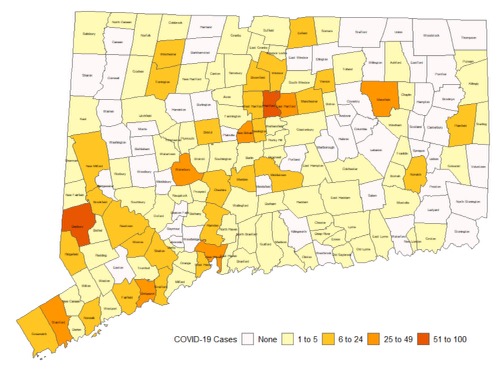Covid-19 Cases per town 100,00 in CT on September 19th vs. Covid 19 Cases per town on October 19th Photo Courtesy of CT DPH
After months of keeping the number of new Covid-19 cases low in comparison to other states in the U.S., Connecticut has seen a rapid rise in its daily positivity rate.
On October 27, Connecticut’s daily positivity rate for Covid-19 hit 4.1%, surpassing 4% for the first time since early June. This comes after 802 new reported cases on October 18, the highest daily increase since May. As of October 27, there are 309 patients currently hospitzlied due to Covid-19, the highest since June.
According to the established town-level response framework by the Connecticut Department of Public Health (DPH), 19 towns are now placed in “red alert” — indicating that they have a daily infection rate of over 15 per 100,000 population. Despite beginning phase three of reopening on October 8, some of the red-coded towns are now reinstating restrictions with concerns over the increasing number of Covid-19 cases. Windham, for example, has announced both a return to virtual learning for schools and a revert back to phase two for businesses.
Governor Ned Lamont remains optimistic, however, about the state of the pandemic in Connecticut. At a news conference on October 22, he said, “We continue to do a lot of polymerase chain reaction (PCR) testing, 22,000 [a day], and the positivity rate [is] 2.3%. That’s a lot better than where we were a few days ago. I can tell you it’s not a lot more than where we were a couple months ago.”
Although total hospitalizations have increased, Lamont also stated that the percent of patients needing intensive care has decreased in the past six months from 33% to 20% — with only a 6% fatality rate for those patients. “It’s trending up in a slightly controlled way,” he said.
In an effort to encourage Covid-19 safety and awareness, Governor Lamont is working with Glastonbury-based media company Cronin and Off Leash Studios to create a statewide campaign on a variety of platforms — ranging from the radio to social media — encouraging residents to act safely during the ongoing pandemic. The team is working on producing television spots that feature Connecticut celebrities performing the three essential steps to prevent the spread of the virus: wear your mask, wash your hands, and watch your distance.
Along with the increase in Covid-19 cases, healthcare providers in Connecticut are also seeing a rise in the need for Covid-19 testing. To ramp up their testing services, a network of primary care clinics in Connecticut called the Community Health Center (CHC) works to ensure Covid-19 testing remains an accessible option for all. Vice President of Communications Ms. Leslie Gianelli said, “We don’t require appointments, we test everyone. Testing is free, and, unlike a lot of the organizations that are providing testing now, we test children.”
The CHC is currently providing testing services five days a week at almost all of its healthcare locations. In addition to its main offices, the CHC is also operating four or five pop-up mobile sites daily. “We coordinate with various community organizations,” Ms. Gianelli said. “It could be a housing complex, a school, [or] a church.” Currently conducting on average about 2,000 tests every day, the CHC may need to increase the opening of testing locations to seven days a week to accommodate the new demand for testing, according to Ms. Gianelli.
Ms. Gianelli described the testing process provided by the CHC as relatively simple. Clients can either drive or walk up to testing sites from 8:30 a.m. to 4:00 p.m. After registration is completed, clinical providers with personal protective equipment conduct the test, which takes less than five minutes. In two to three business days, results are privately released to the patient through an online patient portal. People who have tested positive will also receive a call from a nurse at the CHC to plan the next steps of their treatment.
While the CHC provides testing and primary care services, it does not conduct contact tracing. “We report on a daily basis our results to the state, so the state knows who has tested positive within each of the testing facilities around the state, and then the state has the responsibility for contact tracing,” said Ms. Gianelli. The state’s contact tracing program, ContaCT, reaches out to all citizens with positive test results via the local health department. Those infected are then entered into the system along with a log of their close contacts during the possible period of infection. The listed contacts would be alerted of their possible exposure to Covid-19 either via phone call or text.
To combat the pandemic, a statewide effort by the government, healthcare providers, and the people is crucial.
“I know this has been going on for a long time,” Governor Lamont said. “We’re not quite out of the woods yet. But, we will be if we stay careful, stay cautious, wear the mask, and take care and look out for each other.”






